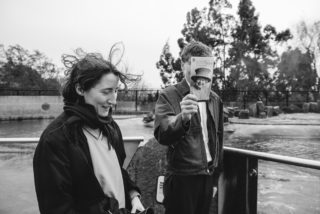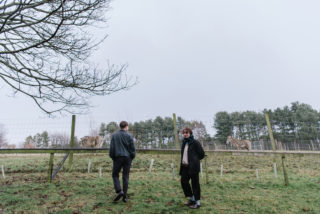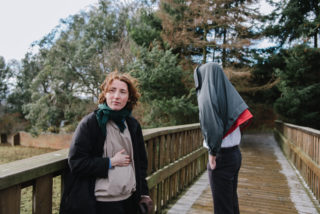We asked ******** a bunch of questions and they answered them all in Gary Barlow quotes
We don't know why

We don't know why
“It’s a pass I’m afraid,” said the Domino Records PR person, and for a time, that was that. But what did we expect from a group known only as ********? Earlier this year, the elusive Edinburgh duo released their first and final album ‘The Drink’. The album’s a great dirty pint, brewed of everyday cataclysmic nuisances – sell-out shock-comedians, Christmas shopping, TV therapists, Reddit pages of recommended suicide methods, etc – that, eerily enough, manages to recall the dearly departed Mark E. Smith’s misanthropy, reinterpreted by disaffected art school yahoos.
Nevertheless, the mystery of ******** was all too tantalising, and we were more than willing to drink the long draught. The monotonous voices and hammered synthesizers of Ailie Ormston and someone named Ω betray little of their personalities beyond a disaffected smugness, largely associated with the independent music scene in Glasgow and Edinburgh, and the way Scots young and old generally tend to regard things down south. Naturally, we had many burning questions: who are you? Where did you come from? What’s this “New Weird Britain” thing, then? If anything, the list of questions was a sobering reminder of music journalism’s shoehorning tendencies. Maybe it was inevitable we would bring too much of ourselves to this Q&A, but only because the enigma of ******** gave us little to work with in the first place.
An hour into our disappointment, another message appeared from Domino. The duo would be happy to answer our questions via e-mail, but we readily expected another catch. “Authorship and individualism are discouraged; preciousness of ownership is challenged,” read ‘The Drink’s release statement. True to “promising and disparaging” form, all of ********’s answers here come from Gary Barlow interviews for The Guardian, The Telegraph and something called driving.co.uk.
Who can say why. It’s quite funny – especially considering it may have taken the duo longer to select and copy-paste Barlow’s answers appropriately (some more successfully than others) than to provide their own. But what could be more punk-subversive than responding to interview questions in the words of a tax dodger – or worse, a televised singing competition judge? Rightly or wrongly, we expected and hoped for some structure, condolences in a world gone to shit, if not some vague sense of solidarity from artist soothsayers. Devoid of hope, we print this Q&A as if holding fragments up to the light, hoping that Gary Barlow’s exact height might hold some deeper significance in our troubling times.

How are things going?
We’re in such a good place now as a family. It’s the same for my career. I say no to so many things; I never used to be able to.
Who exactly are ********?
I’m 5ft 8in. I’d love to be taller.
How do I pronounce ********?
Thinking negatively.
How did ******** come about? How did you come across each other?
When I was 16, I took a demo tape to the publisher of a record company, who played it while I sat there. He then opened the window, threw the cassette out and said, “Never come back again.”
Reportedly, ‘The Drink’ is your first and final release as ******** – is this the case? And why?
Las Vegas. I often take the kids in the summer and we have a ball. It’s so ghastly and awful and manmade, and I just love it. I don’t gamble, though – I find being in the music industry enough of a gamble.
Your inspiration comes from the everyday – but what about the music? I hear in ‘The Drink’ the influence of The Fall and This Heat, musicians who were famously dissatisfied with the music they were hearing at the time, so they made something else. Can you relate to that feeling? What musical influence, if any, do you find carries across into your own output?
I sing and go into my own world a lot. That’s the biggest complaint: not being present.
You both seem to come from visual art backgrounds – did that also inform your approach to music?
The world was our oyster in 1993 and the Range Rover was the only car that could match my ego at that point. It guzzled fuel. I spent my whole life filling the damn thing up.
On your album’s press release, there reads an acronym: Generally Underwhelmed. Incognito. Niceties. Not Even Slightly Suggestive. What can you tell me about “Guinness”?
It comes from having that period when I didn’t work. That really was the worst bit. It wasn’t not being famous any more, or even not being a recording artist. It was having nobody who needed me, no phones ringing, nothing to do. Because I’m still too young to do nothing. I was only 24 when all that happened. Now, at 40, I feel I’ve got more to give than I ever have.
“Authorship and individualism are discouraged; preciousness of ownership is challenged,” says ‘The Drink’’s press release. Does this address your approach to collaborative songwriting?
If I get an hour, I reach for a book. I am reading an old Stephen King book at the moment called The Stand.
One aspect of your ethos is that you’re “capable of compromise.” Could you elaborate?
Stephen Fry would be a brilliant dinner guest. I have had dinner with Elton John many times and he’s always a hoot: he is so brilliantly bitchy, and he loves football.
I’ve read that these songs existed in one form or another on YouTube. What made you decide to actually put them on record? Were you approached by the label? I get the impression that ‘The Drink’ wasn’t even necessarily meant to be heard as an album.
Let It Shine.
Was there a rationale to how an album was put together from these songs, in terms of tracklisting and artwork?
My wife.
I was surprised with how I could relate to many songs on ‘The Drink’, mainly because I myself feel a similar sort of amorphous dissatisfaction with contemporary society, which I think is a central theme running through the album. Is this something you could speak to?
It comes with a government health warning. But most people have at some point got to pick themselves up – you’ve got to turn up for work and get on with it. I can be stood here, loaded with stuff, but I don’t want to tell anyone, and by you all ignoring it, you are actually helping me right now.

Google ********, and you’ll get next to nothing. Was that intentional?
The one thing I was dreading was that the last album would be on my shoulder the whole time I made this one.
Did you happen to catch the music writer John Doran playing a track of yours on Radio 3’s ‘Late Junction’, and your coverage on Tiny Mix Tapes? What happens if ******** blows up?
Absolutely everything. They were one of the few couples in history who never really argued. They were very positive. When my dad died, someone said that he was very happy in his own skin.
If the hype is to be believed, there’s something of a “scene” currently happening in Glasgow, perhaps related to what John Doran calls “New Weird Britain” with groups like Happy Meals and stuff on Domestic Exile. Are you aware of any such a scene, or even just a shared mentality within music, arts and independent culture in the Glasgow area?
Going back to where I was in 2002. I didn’t have a record deal. I was very fat. It was a bad place.
Have ******** ever performed live, and do you intend to in future?
I split my trousers on stage in Germany in the early ******** days. I made the situation worse by edging over to the side of the stage. I should have just gone to the crowd, “Look what I’ve done!” They would have loved it.
‘The Drink’ deals with, as you say, “contemporary and indifferent existence in The West”, which I take to mean the brutality and boredom of late capitalism. Do you think of The Drink as being in any way political?
With ******** we’d explored most styles and everyone expects me to do ballads, that is what I am known for but for this, the whole folk tempo felt right. It is a very good backdrop to write something quite negative over. I realised I could get away with some really dark lyrics and it unlocked the whole album for me.
What’s next for you, as a group or as individuals?
The cancan. It’s celebratory and it would demonstrate the ridiculousness of this life.
Are things as shit as they appear in the world of ********?
I’m the last generation that started off singing in social clubs. My parents would drive me there and people would scowl at this young lad with blond spiky hair about to come on stage. But I loved winning them around – I would make the people go from scowls to standing up clapping. That was my apprenticeship. So when I go on tour and I have two hours to take an audience on a journey, where you have them going crazy at the beginning, you make them cry a bit in the middle and then you have them happy at the end. That to me is a lost art.